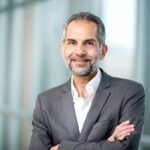Volume 36 Number 1 | February 2022
 Hassan Aziz, PhD, FACSs, MLS(ASCP)CM, ASCLS President
Hassan Aziz, PhD, FACSs, MLS(ASCP)CM, ASCLS President
Like many industries, healthcare is facing a growing responsibility to improve diversity, equity, and inclusion (DEI) efforts. DEI has been an increasing focus for organizations across the world, but none stand to make a greater impact than the healthcare industry. DEI is not limited to recruiting and retaining a diverse workforce. The effects extend to impact the communities we serve and the way we interact with and treat patients from diverse backgrounds.
Let’s start with defining the terms in DEI. Diversity is understanding the background of the workforce and patients being served, including culture, gender, sexual orientation, religious beliefs, and socioeconomic status. Also, hiring and retaining a workforce that is representative of the patient population served. Equity, not to be confused with equality, is ensuring healthcare workers have what they need to do their jobs and patients have what they need in and out of treatment settings to effectively benefit from best practices in treatment. Last, inclusion is giving both workers and patients a voice to help provide/receive high-quality care and encouraging the presence of a diverse healthcare staff in the treatment experience of patients.
At the American Society for Clinical Laboratory Science (ASCLS), our ongoing work is not easy, and we understand that it is often never ending. We recognize our ability and responsibility to further meaningful dialogue, programs, and policies that support diverse representation, equitable access and care, and respectful inclusivity within all aspects of healthcare. We remain committed to developing and cultivating a culture of compassion and acceptance. We understand culture does not happen by accident. It should be rooted in the fabric of our Society and cultivated in each and every one of us.
To bolster DEI efforts within the profession, we have a unique opportunity to improve the lives of those providing and receiving care. Given that this is such an important responsibility, ASCLS and laboratory professionals can solicit input from the diverse and underserved populations we serve and use their perspectives to help shape our approach to education programing, clinical affairs, policy and advocacy, data analytics, and communications. ASCLS made a commitment to making DEI a focus of our Board of Directors, committees, and task forces.
Further, healthcare organizations must be committed to hiring, compensation, and promotion processes that are free of bias. These organizations must be sincere in their efforts to recruit and hire diverse individuals for roles throughout the organization and maintain a workplace that encourages retention, development, and promotion for all employees. This should be accomplished while ensuring fair and equitable compensation and benefits for all members of staff.
It is also critical for employers and organizations to provide communication tools to promote their goals towards DEI. Fostering an inclusive work environment starts by creating a safe space for all workers to raise questions and concerns on any subject. Diversity, recruitment, and promotion of staff and leadership should be tracked, while empowering employees to provide honest feedback on DEI efforts. This can be accomplished through frequent meetings, surveys, annual performance reviews, and an “open door” culture.
Each year, we set measurable goals in each of the DEI areas. And we track our success and areas of growth. ASCLS has been committed to embedding diversity, equity, and inclusion into our educational offerings, such as conferences and professional development events we hold each year. We strive for our tenets to be reflected in our speakers, audiences, and content matter.
Embracing a culture of DEI has to be deliberate. We should define it and then live it. We are all equally responsible for it. By doing so, we have the opportunity to continue to create a unique and welcoming environment for all who we serve.
Hassan Aziz is Dean of the College of Nursing and Health Sciences at Texas A&M University-Corpus Christi.
 Hassan Aziz, PhD, FACSs, MLS(ASCP)CM, ASCLS President
Hassan Aziz, PhD, FACSs, MLS(ASCP)CM, ASCLS President